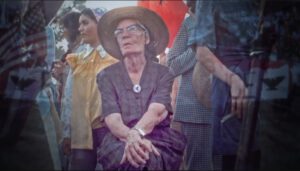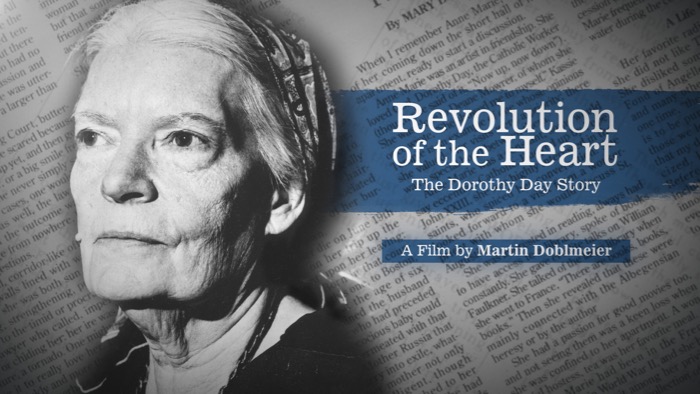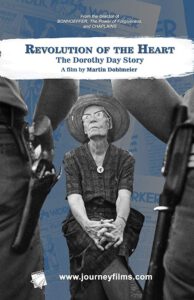Movie Info
Movie Info
- Director
- Martin Doblmeir
- Run Time
- 58 minutes
- Rating
- Not Rated
Relevant Quotes
“We cannot love God unless we love each other, and to love we must know each other. We know Him in the breaking of bread, and we know each other in the breaking of bread, and we are not alone anymore. Heaven is a banquet and life is a banquet, too, even with a crust, where there is companionship.
We have all known the long loneliness and we have learned that the only solution is love and that love comes with community.
It all happened while we sat there talking, and it is still going on.”
Dorothy Day, conclusion of “Postcsript,” The Long Loneliness.
I have lost track of how many Martin Doblmeier films I have reviewed, this documentarian is so prolific, but there has never been one that I couldn’t recommend with enthusiasm. He has a knack for condensing a lot of history into the less than an hour length film suitable for fitting into a PBS one hour time slot. The subject of his latest film biography, activist Dorothy Day, lived such a long and eventful life that his film is brimming with photos, narratives by those who knew her, and archival footage, much of which features her speaking for herself. A striking feature is the inclusion of Dorothy’s favorite contemporary artist Fritz Eichenberg’s famous print “Christ of the Breadlines,” immediately followed by a newsreel clip of a Depression era breadline.
Dorothy was active from the suffragette days of the First World War through the fierce opposition to the Vietnam War in the Sixties. She moved from her Socialist-Communist leaning years as a radical journalist reporting on the terrible living conditions of the poor to membership in the Catholic Church following the birth of her second child, a daughter she named Tamara. Her embracement of the Catholic faith led to her break with her lover, who, along with most of her other leftist friends, was staunchly atheistic and anti-church. When her writings drew the attention of French activist Peter Maurin, she was swayed by his teachings and gave in to his demand that she found a newspaper to carry the message of the social gospel to the masses. Peter, whom Dorothy calls “Peasant of Pavements” in her autobiography The Long Loneliness (a favorite book in my library!), was indeed a French peasant, but well educated, choosing a life of poverty and travel to spread Christ’s message of love.
Founded with very little money on hand, The Catholic Worker sold for a penny, and thus soon gained a wide readership. She soon found herself feeding the hungry and providing shelter for the homeless. Her life and her paper embodied Peter’s teaching, best summed up in one of his quotations that she used often, “We need to make the kind of society where it is easier for people to be good.” But this would not be easy, as Dorothy says in the film that reading the Sermon on the Mount is enjoyable, but practicing it is something else. Her absolute pacifism was so controversial that FBI Director J. Edgar Hoover had her on his “Watch List,” and the Archbishop of New York asked her to remove “Catholic” from the masthead of her newspaper to appease his conservative members. Although readership of the Catholic Worker had climbed to 150,000, many readers became so angry at the radical opposition of General Franco during the Spanish Civil War that it plunged to 30,000.
Dorothy campaigned for child labor laws, women’s rights, and supported the Civil Right’s movement and Cesar Chavez’s grape boycott, and of course the anti-Vietnam War movement. Despite her congenital heart condition, she remained as active as possible up to her death in 1980 (of a heart attack). Her network of a little over 200 hospitality houses has spread throughout the world and continues her legacy of love for the poor, as does her newspaper.
Filmmaker Martin Doblmeir narrates the film, skillfully tying visuals and interviews together. Among others, those interviewed include the founder of Sojourners, Jim Wallis; Robert Ellsberg, Dorothy’s biographer; theologian Cornell West; Sr. Joan Chittister, activist nun; Dorothy’s grand-daughter Martha Hennessy; actress/activist Susan Sarandon; and actor/activist Martin Sheen. For me the latter was especially enjoyable because I love the film in which he portrays Peter Maurin, Entertaining Angels: the Dorothy Day Story, a moving theatrical film produced by Paulist Productions and starring Moira Kelly as Dorothy.

PBS’s one-hour limitation means that many interesting facts about Day have to be reduced or left out entirely—her love affairs with Mike Gold and Lionel Moise and brief marriage to Berkeley Tobey and trip to Europe; the publication of her book The Eleventh Virgin and brief stint in Hollywood that enabled her to buy her cottage on Staten Island; her 1957 short visit and work with Clarence* and Florence Jordan at their interracial Koinonia Farm in Georgia; and her trip to India and visit with Mother Teresa—for more on these incidents see the two references below.**
As he has with such luminaries as Dietrich Bonhoeffer, Howard Thurman, and Reinhold Niebuhr***, Martin Doblmeir brings the life and message of this remarkable person to a wide audience. I hope it will lead many to read her books, as his other films have done so for their subjects. By all means, check your local PBS schedule and spread the word about it. This is a movie that matters!
* Martin, if you read this, how about centering one of your fine biographies on Clarence Jordan, author of the delightful New Testament Gospel translations that Harry Chapin developed into the musical The Cotton Patch Gospel? What a film that would make, especially if you can secure rights to clips from the musical—and there’s a tie-in of Americus, Georgia with President Jimmy Carter.
**For a long and excellent biographical article go to the Wikipedia entry “Dorothy Day.” Also excellent, providing many details beyond Wikipedia is Elizabeth Hinson-Hasty’s book DOROTHY DAY for Armchair Theologians
*** Be sure to see the filmmaker’s Journey Film’s website. My reviews of most of the films can be found listed in VP’s index.
This review will be in the February issue of VP along with a set of questions for reflection and/or discussion. If you have found reviews on this site helpful, please consider purchasing a subscription or individual issue in The Store.


